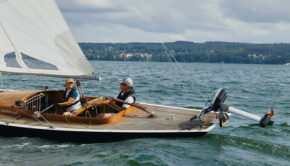Debating sustainability of teak decks
Published on April 21st, 2020
As the world’s largest trade exhibition for the international marine leisure industry, METSTRADE is held annually in Amsterdam, Netherlands. This B2B bonanza is massive and maintains interest during the year by highlighting issues within the trades.
Among the issues recently profiled was the status of teak decks, and whether the usage of this wood, due to forestation issues, would become a thing of the past. It proved to be a risky topic as we share commentary that responds to the METSTRADE report:
Peter Wormwood:
Read the complete article and you will see that it was written to sell man-made decking products at the METS show.
If the author had done the research necessary to take it out of the Puff-Piece category, he would have included the information about the strides taken recently in Myanmar (Burma) to correct years of mismanagement and put the industry back on the sustainable path it used to follow. This information is readily available to a serious journalist.
The article also fails in balance by not discussing the environmental harm in manufacturing the synthetic products. From having worked within the teak industry for many years, I can report that the teak deckers have become incredibly efficient at reducing waste to a minimum and working efficiently to offset the high cost of the wood species.
Like most boating and yachting products, teak decks are getting more expensive over time. As a result we may see less teak on a given yacht in the future, but the positives that it adds to the yachting experience will keep it aboard for some time to come…
Matthew Pidsley:
I felt compelled to write an open reply to your article, so abundant in unfounded nonsense that I have felt the urge to present, in short form, some facts pertaining to the marine teak industry.
I have worked within the superyacht sector both on the build side and running vessels of up to 115m for 15 years, during this time I have sourced and laid numerous teak decks, from forest to foredeck.
Sam Llewellyn’s statement borders on laughable; he draws on no empirically sound objective evidence to support this view, and opens with, “Some people including me, dislike teak decks because whatever anyone tells you, they get filthy.”
I’d like to know when this became relevant in any way to its sustainability. Sam, anything unwashed becomes filthy, I hate to break it to you.
The following statement that “the sustainability of teak is open for debate” is what one might kindly deem duck speak – thoughtless, meaningless waffle. It says nothing, whilst being sufficiently ambiguous, in a vain attempt to invoke validly in the previous statement.
Let me be clear from the outset – I have no personal preference regarding the finish of decks, I have laid everything from Bojonegoro teak, Tectona grandis to Synthetic teak, sourced from many different regions in the world. I have also been involved with non-skid paint finishes on vessel of up to 60m. It depends entirely on the yacht aesthetic and budget of each vessel respectively.
Some owners have approached me with mandates (prior to the build), stipulating ethically sourced, renewable forestry that complies with the highest codification available. This can and has been executed without issue, equally others look to focus more on price point and have less emphatic requirements on its source, but none the less regulations governing the industry dictate standards must be met on an international level of purchasing and production alike.
This is present in every aspect of material selection throughout all industries, but of much higher value than most in the yachting market, we deal with an economics of production that on the most part is far less price sensitive.
The main issue for me here is that facts have been totally overlooked in favor of highly subjective thoughtless finger pointing, what can be clearly characterized as virtue signalling.
Let me speak plainly – teak is used on traditional yachts, and modern yacht alike because it is hands down the best product for the purpose, practicality being the focus: it is extremely hard wearing, moisture resistant and stands up incredibly well against the elements.
Hence, it’s use throughout all sectors of the marine world.
Teak is sustainable by definition, if managed correctly. Which on the most part it has been within the marine sector over the past 50 years. Who else has the means to choose to source ethically managed forestry?
I put it to you that the problem lies not with the marine industry which occupy but a fraction of the market, but instead with the international furniture and housing sector, wherein the sourcing of teak for production is so price sensitive that it invariably comes from a lower cost production source, catering for the mass market. Fair inferences can be made here.
The recent report from ITTO (International Tropical Timber Organization) on the management of sustainable teak forestry makes for enlightening reading should you wish to cast your eyes over some primary data rather than jumping on the eco warrior buzz word band wagon, which serves no purpose other than, in this case perhaps, to vex me sufficiently to outline the facts objectively, rather than in a fictional sense, as Sam may be more familiar with.
Now, for a “performance” sailor, let’s start to ask more poignant questions, namely the use of carbon fiber composites and high energy synthetics in modern yacht construction for sails and racing boats.
Really, GRP, carbon and PVC synthetic production makes the use of teak in decking as an environmental concern pale into insignificance. The rarely quantified negative externalities of per unit production in these materials almost goes Ali most unnoticed on a global level.
Now, I am not denying that teak forestry needs continuing examination, of course it does, as do all primary source material harvesting methods.
The reality of the matter is, comparatively the yachting industry amounts to a minuscule percentage of teak use world wide, and ironically it actually leads the way in ethical sourcing: encouraging and the promoting sustainability. Of course, there are exceptions to every rule and to date there have been a small number of high profile cases, but this is a very small number and very rarely.
Life is still life and people still try and cut corners. Naturally, the focus of the media is to sensationalize any fault made by high-net-worth individuals, superyachts remain a source of mystery and ultimately jealousy, any situation highlighting infringements in legislation sells papers.
Next time we consider who’s actually doing the damage here, those in favor of replacing teak decks with plastic high energy synthetics or those using a renewable, ethically sourced manageable resources in micro amounts.
Perhaps take a look at the furniture in our homes, got any cheaper flat pack items, low cost kitchens? Cut price window frames? Sure.
I would further question the motivation of this article in its entirety given the following paragraph in your colleagues article, to whom you allude:
—————–
Plenty more to choose from
Such is the growing choice and continuing development of these synthetic decking alternatives that there are far too many to list here, although ‘Nuteak’ and ‘Atlanteak’ are also worthy of mention. Some of the others are based on UV stabilised foam materials in a variety of textures and colours. These include trade names such as, ‘Seadek’, ‘Raptor Deck’, ‘GatorStep’ and ‘MarineMat’, all of which offer a kind of cool, cushioned, foot friendly deck surface.
So, whatever boat builders and designers are looking for in the way of alternative decking materials, METSTRADE 2020 is sure to be the place where a good selection of them can be checked out this year.”
—————–
Funny, isn’t it, how your article encourages the very product of those clients who sell these teak alternatives featured at the METSTRADE 2020.
Coincidence?









 We’ll keep your information safe.
We’ll keep your information safe.